外研版英语七年级下册知识点总结
外研版英语七年级下册各单元知识点汇总
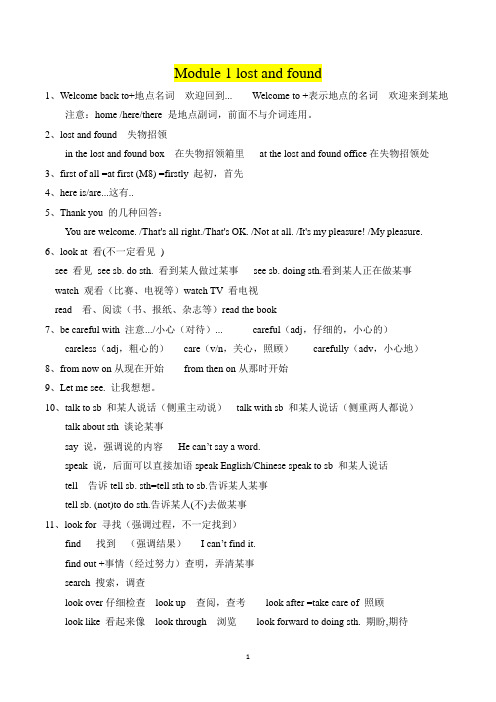
Module 1 lost and found1、Welcome back to+地点名词欢迎回到... Welcome to +表示地点的名词欢迎来到某地注意:home /here/there 是地点副词,前面不与介词连用。
2、lost and found 失物招领in the lost and found box 在失物招领箱里at the lost and found office在失物招领处3、first of all =at first (M8) =firstly 起初,首先4、here is/are...这有..5、Thank you 的几种回答:You are welcome. /That's all right./That's OK. /Not at all. /It's my pleasure! /My pleasure.6、look at 看(不一定看见)see 看见see sb. do sth. 看到某人做过某事see sb. doing sth.看到某人正在做某事watch 观看(比赛、电视等)watch TV 看电视read 看、阅读(书、报纸、杂志等)read the book7、be careful with 注意.../小心(对待)... careful(adj,仔细的,小心的)careless(adj,粗心的)care(v/n,关心,照顾)carefully(adv,小心地)8、from now on从现在开始from then on从那时开始9、Let me see. 让我想想。
10、talk to sb 和某人说话(侧重主动说)talk with sb 和某人说话(侧重两人都说)talk about sth 谈论某事say 说,强调说的内容He can’t say a word.speak 说,后面可以直接加语speak English/Chinese speak to sb 和某人说话tell 告诉tell sb. sth=tell sth to sb.告诉某人某事tell sb. (not)to do sth.告诉某人(不)去做某事11、look for 寻找(强调过程,不一定找到)find 找到(强调结果)I can’t find it.find out +事情(经过努力)查明,弄清某事search 搜索,调查look over仔细检查look up 查阅,查考look after =take care of 照顾look like 看起来像look through 浏览look forward to doing sth. 期盼,期待12、get on/off the bus 上/下公交车get in/out of the car 上/下小车13、in a hurry 匆匆忙忙hurry up=come on 快点儿,赶紧hurry to do sth 匆忙去做某事(there’s)no hurry 不忙,不必着急P8314、every day 每天时间状语everyday 每天的,日常的(形容词,后面接名词)15、many other things 许多其他的东西16、at the/ this moment=now此时此刻,现在at that moment=then 在那时17、a lot of =lots of =some许多既可以修饰可数名词,也可以修饰不可数名词。
外研版七年级下册英语重点知识点汇总

外研版七年级下册英语重点知识点汇总Module 1 Lost and FoundIn this module。
we learn some XXX related to lost and found items。
Firstly。
we have the "lost and found box," which is aplace where lost items are kept until they are claimed。
We also learn to be careful with our belongings and to look for lost items。
From now on。
we should try to be more XXX.If we do lose something。
we can try to find it by looking around and asking others for help。
It's XXX hundreds of items are lost every day。
so we should be XXX in our search。
First of all。
we should check the lost and found box to see if our item has been turned in。
If we don't find it there。
we can try to ask around and see if anyone has seen it.When looking for lost items。
we can choose from different methods。
We can try to find it ourselves。
or we can ask othersfor help。
外研版七年级下册英语重点知识点汇总
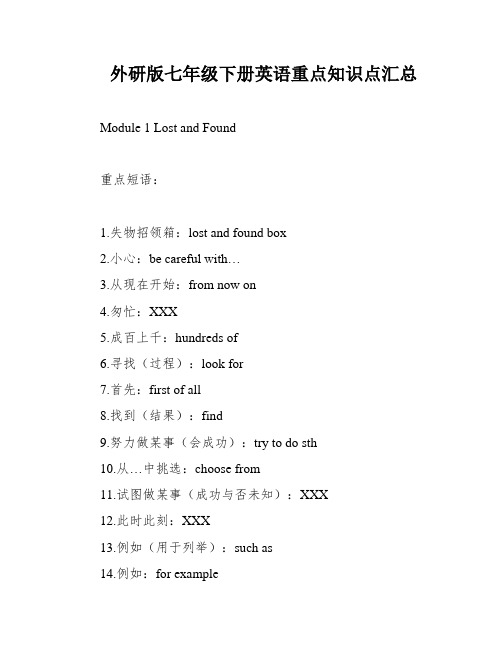
外研版七年级下册英语重点知识点汇总Module 1 Lost and Found重点短语:1.失物招领箱:lost and found box2.小心:be careful with…3.从现在开始:from now on4.匆忙:XXX5.成百上千:hundreds of6.寻找(过程):look for7.首先:first of all8.找到(结果):find9.努力做某事(会成功):try to do sth10.从…中挑选:choose from11.试图做某事(成功与否未知):XXX12.此时此刻:XXX13.例如(用于列举):such as14.例如:for example重点句型:1.这是谁的 (XXX)2.帮助某人做某事:help sb do XXX.3.请小心保管…:XXX…4.欢迎来到…:e to +地点5.给某人打call sb at +电话号码语法总结:物主代词:表示所属关系的代词(…属于谁的)单数:人称形容词性物主代词名词性物主代词第一人称 my XXX第二人称 your yours第三人称 his hers its复数形容词性物主代名词性物主代第一人称 our ours第二人称 your yours第三人称 their theirs形容词性物主代词:必须和名词在一起,例如XXX,your XXX…名词性物主代词:相当于与之相对应的形容词性物主代词+名词,例如XXX.Module 2 What Can You Do?重点短语:1.与某人相处融洽:get on well with sb.2.弹钢琴:play the piano3.打乒乓球:play table XXX4.…怎么样?=how about…。
what about…5.担心…:XXX…6.擅长做某事:be good at doing sth.7.放风筝:fly a kite重点句型:无语法总结:无2.high-tech高科技的3.XXX虚拟现实4.XXX机器人仆人5.XXX太空旅行6.XXX可再生能源7.self-driving cars自动驾驶汽车8.ic engineering基因工程9.XXX寿命10.artificial intelligence人工智能重点句型】1.In the future。
外研版英语(新标准)七年级下册模块知识点归纳总结(全册)
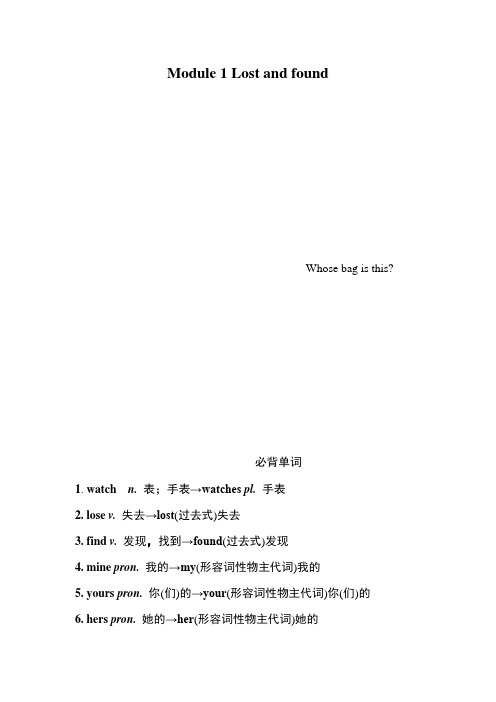
Module 1 Lost and foundWhose bag is this?必背单词1. watch n.表;手表→watches pl.手表2. lose v.失去→lost(过去式)失去3. find v.发现,找到→found(过去式)发现4. mine pron.我的→my(形容词性物主代词)我的5. yours pron.你(们)的→your(形容词性物主代词)你(们)的6. hers pron.她的→her(形容词性物主代词)她的7. careful adj.仔细的;认真的;小心的→carefully adv.仔细地;认真地;小心地8. crayon n. 蜡笔9. eraser n. 橡皮擦10. glove n. 手套11. wallet n. 钱包12. whose pron. 谁的13. tape n. 录音带;录像带14. purple adj. 紫色的;紫红色的;n. 紫色;紫红色必背短语15. first of all 首先,第一16. look at 看17. be careful with 小心(对待)……18. from now on 从现在开始19. a lot of 许多,大量20. lost and found box 失物招领箱必背句子21. Welcome back to school, everyone!欢迎大家返校!22. Whose bag is this?这是谁的书包?23. Here's a purple wallet!这里有一个紫色的钱包!24. Let me see...让我看看……Are they yours?必背单词1. leave v.丢下;遗忘→left(过去式)丢下;遗忘2. strange adj.奇怪的→stranger n.陌生人3. camera n. 照相机4. phone n. 电话;电话机5. plane n. 飞机6. taxi n. 出租车7. why adv. 为什么8. airport n. 机场;航空港9. hundred num. 百10. thousand num. 千11. boat n. 船12. duck n. 鸭13. pig n. 猪14. sausage n. 香肠;腊肠必背短语15. mobile phone 移动电话;手机16. lost and found office 失物招领处17. in a hurry 匆匆忙忙18. hundreds of 几百;成百上千19. look for 寻找20. at the moment 目前;此时必背句子21. Welcome to the New York City Lost and found office.欢迎来到纽约市的失物招领处。
外研版七年级下册英语知识点

外研版七年级下册英语知识点一、动词的时态英语动词根据时间的不同,可以分为一般现在时、一般过去时和一般将来时。
1. 一般现在时:表示经常性的动作、习惯、真理、客观事实等。
例句:I often go to the park on weekends.She speaks English very well.2. 一般过去时:表示过去某个时间发生的动作或状态。
例句:He watched a movie last night.They lived in London two years ago.3. 一般将来时:表示将来要发生的动作或存在的状态。
例句:We will visit our grandparents next week.She is going to travel to France next month.二、名词的数英语中,名词的数有单数和复数两种形式。
1. 单数名词:表示一个人或事物。
例句:There is a cat in the garden.He is my friend.2. 复数名词:表示多个人或事物。
例句:There are many books on the shelf.They are my friends.三、形容词的比较级和最高级形容词的比较级和最高级可以用来比较两个或多个人或事物的程度。
1. 比较级:用于比较两个人或事物。
例句:She is taller than her sister.This book is more interesting than that one.2. 最高级:用于比较三个或三个以上的人或事物。
例句:He is the tallest boy in the class.This is the most expensive car in the showroom.四、情态动词情态动词可以用来表示说话人的态度、意愿、推测、可能性和应该性等。
1. can:表示能力和许可。
外研版初一英语(下册)知识点归纳

MODULE 1一.短语归纳。
1. lost and found box 失物招领箱2.be careful with…小心…3. from now on 从现在开始4.(be) in a hurry 匆忙5. hundreds of 成百上千6.look for 寻找(过程)7. first of all 首先8.find 找到(结果)9. try to do sth 努力做某事(会成功)10.choose from 从…中挑选11.try doing sth 试图做某事(成功与否未知)12. at the moment 此时此刻13. such as 例如(用于列举)14. for example 例如二.重点句型结构1.Whose + 名词+is this ? 这是谁的…?2.help sb do sth. 帮助某人做某事3.Please be careful with…请小心保管…4.Welcome to + 地点欢迎来到…5.call sb at + 电话号码拨…给某人打电话三.语法专项。
物主代词:表示所属关系的代词(…属于谁的)人称单数复数形容词性物主代词名词性物主代词形容性物主代词名词性物主代词第一人称my mine our ours 第二人称your yours your yours第三人称his histheir Theirs her hersits its形容词性物主代词和名词性物主代词的关系:形容词性物主代词:必须和名词在一起。
My father, your teacher...物主代词名词性物主代词:相当于与之相对应的形容词性物主代词+名词。
This shirt is mine. =This is my shirt.MODULE 2一.短语归纳。
1. get on well with sb. 与某人相处融洽2.play the piano 弹钢琴3.play table tennis 打乒乓球4.what about…? =how about…?...怎么样?5.worry about…担心…6.be good at doing sth. 擅长做某事7.fly a kite 放风筝8.that’s all 仅此而已9.be ready to do sth. 乐于做某事二.重点句型结构。
(完整版)外研版七年级英语下册知识点归纳及练习

MODULE1一、词汇。
1. listen 听(强调动作)hear 听见(强调结果)I listened carefully but I heard nothing. 我仔细听但什么也没听到2.on a (school) trip3. have a good time = enjoy oneself4. take pictures = take photos5. lie in the sun躺在阳光下lie on the beach 躺在沙滩上躺下【动】She is lying on her back. 她正仰卧着。
位于【动】London lies on the River Thames 伦敦位于泰晤士河畔说谎【动】You are lying to him! 你在对他说谎。
eg: Look! The boy ________on the bed and reading a book.A. is lyingB. lyingC. liesD. lie6. send sb. a postcard 寄给某人一张明信片send sth. to sb. = send sb. sth.7. anyway 无论如何(转移话题)8. buy some presents 买礼物buy sth. for sb. = buy sb. sth.9. enjoy sth. 喜欢某物enjoy oneself = have a good/ great time 玩的开心enjoy/ like doing sth. 喜欢做某事10. at this moment=now 此时此刻(现在进行时)11. leave work 下班be at work 上班He is at work. = He is working12. wait for buses 等公共汽车run for trains 赶乘火车(地铁)13. have afternoon tea 喝下午茶14. watch a ballet 看芭蕾see friends 看望朋友get dressed = dress oneself 穿衣;打扮eg: The boy can’t dress himself.15. call home 给家里打电话call sb. = give sb. a call= phone sb.二、语法。
外研版七年级下册英语知识点归纳
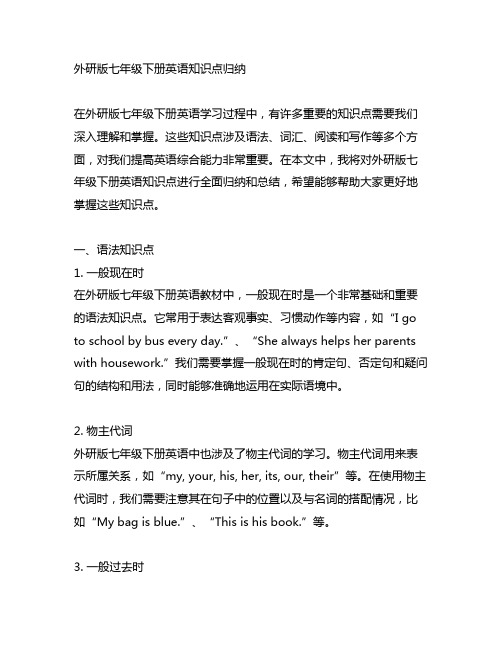
外研版七年级下册英语知识点归纳在外研版七年级下册英语学习过程中,有许多重要的知识点需要我们深入理解和掌握。
这些知识点涉及语法、词汇、阅读和写作等多个方面,对我们提高英语综合能力非常重要。
在本文中,我将对外研版七年级下册英语知识点进行全面归纳和总结,希望能够帮助大家更好地掌握这些知识点。
一、语法知识点1. 一般现在时在外研版七年级下册英语教材中,一般现在时是一个非常基础和重要的语法知识点。
它常用于表达客观事实、习惯动作等内容,如“I go to school by bus every day.”、“She always helps her parents with housework.”我们需要掌握一般现在时的肯定句、否定句和疑问句的结构和用法,同时能够准确地运用在实际语境中。
2. 物主代词外研版七年级下册英语中也涉及了物主代词的学习。
物主代词用来表示所属关系,如“my, your, his, her, its, our, their”等。
在使用物主代词时,我们需要注意其在句子中的位置以及与名词的搭配情况,比如“My bag is blue.”、“This is his book.”等。
3. 一般过去时另外,一般过去时也是外研版七年级下册英语中一个重要的语法知识点。
一般过去时用来表示过去发生的动作或状态,常常与表示过去的时间状语连用,如“last week, yesterday”等。
我们需要掌握一般过去时的构成和用法,能够正确地运用在句子中。
二、词汇知识点1. 数词外研版七年级下册英语中还包括了数词的学习。
数词用来表示数量,有基数词和序数词之分,如“one, two, three, first, second, third”等。
在学习数词时,我们需要注意其在句子中的位置和用法,同时能够正确地读写和运用。
2. 表示时间的词汇除了数词,还有一些表示时间的词汇也是我们需要掌握的,比如“week, month, year, hour, minute, second”等。
七年级下册外研社知识点

七年级下册外研社知识点七年级下册外研社教材是初中英语教材中的一部分,主要包括语法、阅读、写作、听力和口语等多个方面的知识点。
下面将分别介绍这些知识点的相关内容。
一、语法知识点1.单数第三人称单数第三人称指的是以“he/she/it”作为主语的时候,动词的变化形式。
一般情况下,动词在单数第三人称时需要加上“-s”或者“-es”。
例如:He reads books every day. She brushes her teeth twice a day.2.一般现在时一般现在时是指描述现在正在进行或者习惯性发生的事情。
在描述动作的时候,要注意主语、谓语以及时间等元素的搭配。
例如:I usually get up at 6:30 in the morning. He often goes to the park with his friends.3.名词的复数形式一般情况下,名词的复数形式在末尾加上“-s”或者“-es”。
但是,也有一些特殊的名词需要按照不同规则进行复数变化。
例如:child—children, foot—feet, tooth—teeth等。
二、阅读知识点1.推理判断阅读理解中的推理判断是指通过文章中的信息以及自己的知识和常识来进行推断和判断。
在进行推测的时候,要根据文章的细节和线索来确定答案。
例如:根据文章中的描述和“most people think”这个词组,可以推测出某个问题的答案。
2.对话理解对话理解是指通过对文章中对话的理解来回答问题。
在进行对话理解的时候,要注意对话中人物的身份、关系以及他们所表达的含义和态度等信息。
例如:根据一段对话中的表述,可以推断出讲话者想要表达的意思。
三、写作知识点1.书信格式书信格式包括信头、称呼、正文、结尾和署名等几个要素。
在书写书信的时候,要根据信件的类型来选择不同的格式,包括正式和非正式等。
例如:正式信件需要使用较为规范的格式,而非正式信件可以根据自己的口味进行自由发挥。
外研版英语七年级下册知识点总结
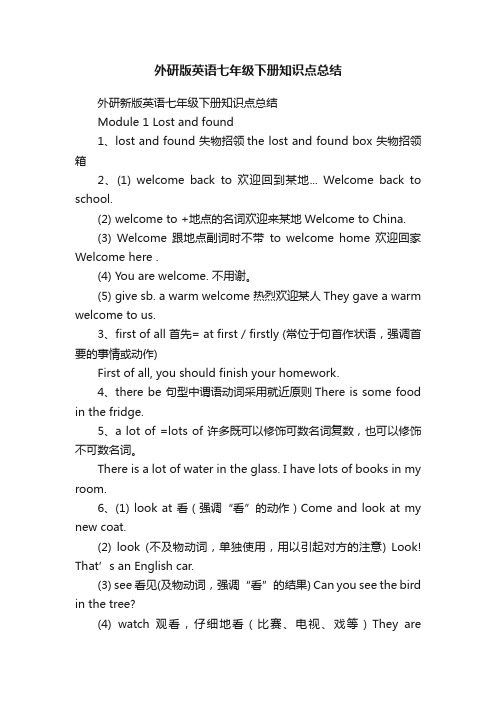
外研版英语七年级下册知识点总结外研新版英语七年级下册知识点总结Module 1 Lost and found1、lost and found 失物招领the lost and found box 失物招领箱2、(1) welcome back to 欢迎回到某地... Welcome back to school.(2) welcome to +地点的名词欢迎来某地Welcome to China.(3) Welcome 跟地点副词时不带to welcome home 欢迎回家Welcome here .(4) You are welcome. 不用谢。
(5) give sb. a warm welcome 热烈欢迎某人They gave a warm welcome to us.3、first of all 首先= at first / firstly (常位于句首作状语,强调首要的事情或动作)First of all, you should finish your homework.4、there be 句型中谓语动词采用就近原则There is some food in the fridge.5、a lot of =lots of 许多既可以修饰可数名词复数,也可以修饰不可数名词。
There is a lot of water in the glass. I have lots of books in my room.6、(1) look at 看(强调“看”的动作)Come and look at my new coat.(2) look (不及物动词,单独使用,用以引起对方的注意) Look! That’s an English car.(3) see 看见(及物动词,强调“看”的结果) Can you see the bird in the tree?(4) watch 观看,仔细地看(比赛、电视、戏等)They arewatching TV now.(5) read 看(书、报纸、杂志等) My mother is reading a book /a magazine /a newspaper.7、everyone/everybody 做主语,谓语动词用单数形式。
外研版七年级下英语知识点总结

Unit1 Can you play the guitar?1.常见的情态动词:cancouldmaymightmust shall shouldwillwould等情态动词+动词原形,疑问句中情态动词提前,否定句在情态动词后加not。
2.Play+ the+乐器play the guitar. play the drums. play the piano. play the violin Play +球类.棋类.牌类游戏play volleyball. play chess.play cards.Play(games)with sb. 和某人一起玩(游戏)3.Join+组织或者人Join the art club join sb. Join in+竞赛.娱乐.游戏等Take part in+活动加入到某活动中Be in 参加.加入.穿着4. what club do you want to join?你想要参加什么俱乐部?The singing club唱歌俱乐部the drawing club 绘画俱乐部the dancing club舞蹈俱乐部the swimming club游泳俱乐部the story telling club 讲故事俱乐部The music /English /art/chess/sports club 音乐/英语/美术/象棋/运动俱乐部5. Pianist钢琴家violinist小提琴手singer歌手dancer舞蹈家musician音乐家6.Let sb do sth 让某人做某事Let’s+动词原形让我们做某事7.Say+内容say hello to sb. say sorry to sb. say to sb.Speak+语言speak English/Chinese/Japanese speak to sb.Talk 谈论talk about sth. talk with sb. talk to sb. talk show脱口秀Tell 告诉.讲述tell sb. sth= tell sth to sb.告诉某人某事tell sb. about sth 告诉某人关于某事tell sb. to do sth. 告诉某人去做某事tell sb. not to do sth 告诉某人不要去做某事tell stories/ jokes/lies讲故事/讲笑话/说谎Ask问.要求ask for 请求ask sb for sth 向某人索要某物ask about询问关于某事ask sb. about sth询问某人关于某事ask sb to do sth 要求某人去做某事ask sb not to do sth要求某人不要去做某事8.Want to do sth.= would like to do sth.=feel like doing sth.想要做某事Want sb. to do sth.= would like sb. to do sth.想要某人做某事Want to be+adj want to be + 职业9.What about =how about,后接名词,代词,动名词what about you你呢?what about the book这本书怎么样?what about dancing跳舞怎么样?10.也:too 肯定句末(前面加逗号)Either否定句末(前面加逗号)Also 实前助后As well 口语中(前面不加逗号)11.be good at+ sth/doing sth=do well in 擅长于…be good for 对…有益(be bad for对…有害)be good to 对…友好(good 可用friendly.nice.kind替换)be good with和…相处好=get on well with= get along well with12.感官动词(look. sound. taste. smell. feel)+ adj做表语13.选择疑问句用or来连接选择部分.回答不用Yes或No.要从中选择一个回答14.students wanted for school show(wanted表示招募.含有被动意义)15.show sth to sb=show sb sth让某人看某物the school show 学校演出give sth to sb=give sb sth给某人某物16.help sb do sth Help sb with sth helpful有帮助的With one’s help= with the help of sb在某人的帮助下Help oneself to 随便享用can't help doing sth.情不自禁做某事17.be busy doing sth忙于做某事be busy with sth忙于某事18.need to do sth need sb to do sth need….for…19.be free to do sth= have time to do sth有时间去做某事Have no time= don’t have time=be busy 没有时间20.make friends with sb 和某人交朋友make money 赚钱make a living 谋生make faces做鬼脸make fun of sb取笑某人21.call sb. at +电话号码call sb. back 给某人回电话22.on the weekend= on weekends23. English-speaking students说英语的学生(English-speaking有连词符,是形容词)24.do kung fu练功夫The old people’s home老人之家the Students’Sports Center25.It is +adj +for sb to do sth做某事对于某人是...形容词修饰名词.副词修饰动词或者形容词26.teach sb sth教某人…. Teach me Chinese teach him MathTeach sb to do sth 教某人去做某事Learn to do sth 学习做某事learn from sb./sth向某人学习、从某事中学习27. Write down写下write to sb =write a letter to sb.给某人写信write back to sb 给某人回信hear from sb 收到某人的来信At least至少make a poster制作海报28.定冠词the的用法(1)特指某(些)人或某(些)物,这是定冠词的基本用法。
外研版初一下册英语知识点归纳.doc
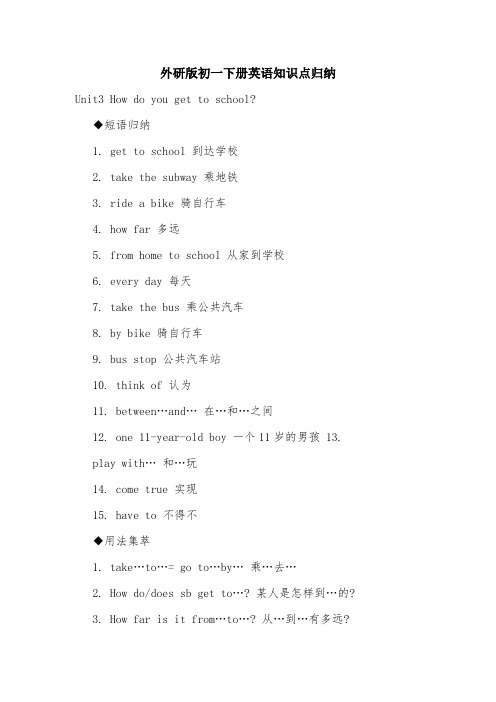
外研版初一下册英语知识点归纳Unit3 How do you get to school?◆短语归纳1. get to school 到达学校2. take the subway 乘地铁3. ride a bike 骑自行车4. how far 多远5. from home to school 从家到学校6. every day 每天7. take the bus 乘公共汽车8. by bike 骑自行车9. bus stop 公共汽车站10. think of 认为11. between…and… 在…和…之间12. one 11-year-old boy 一个11岁的男孩 13.play with… 和…玩14. come true 实现15. have to 不得不◆用法集萃1. take…to…= go to…by… 乘…去…2. How do/does sb get to…? 某人是怎样到…的?3. How far is it from…to…? 从…到…有多远?4. It takes sb. some time to do sth. 做某事花费某人多长时间。
5. How long does it take to do sth.? …花费多长时间?6. It is + adj. + to do sth. 做某事是…7. Thanks for + n./Ving 感谢你(做)某事。
◆典句必背1. —How do you get to school? 你怎么去上学?—I ride my bike. 我骑自行车。
2. How far is it from your home to school? 从你家到学校有多远?3. How long does it take you to get to school? 去上学花费你多久?4. For many students, it is easy to get to school. 对很多学生来说,很容易到达学校。
外研版七年级下册英语知识点及短语
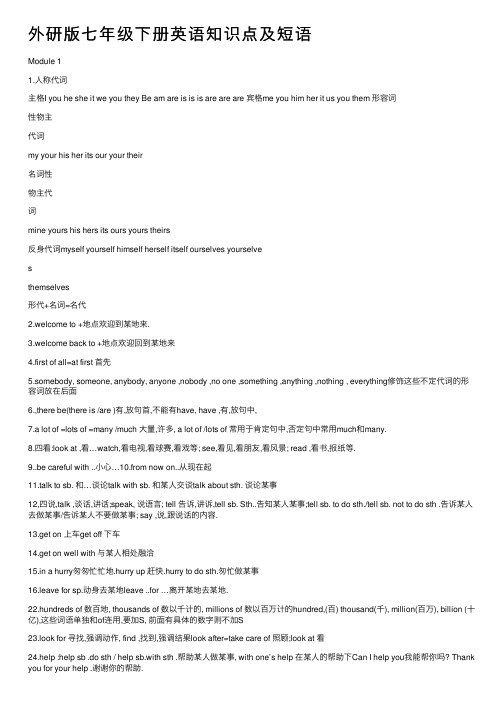
外研版七年级下册英语知识点及短语Module 11.⼈称代词主格I you he she it we you they Be am are is is is are are are 宾格me you him her it us you them 形容词性物主代词my your his her its our your their名词性物主代词mine yours his hers its ours yours theirs反⾝代词myself yourself himself herself itself ourselves yourselvesthemselves形代+名词=名代2.welcome to +地点欢迎到某地来.3.welcome back to +地点欢迎回到某地来4.first of all=at first ⾸先5.somebody, someone, anybody, anyone ,nobody ,no one ,something ,anything ,nothing , everything修饰这些不定代词的形容词放在后⾯6.,there be(there is /are )有,放句⾸,不能有have, have ,有,放句中,7.a lot of =lots of =many /much ⼤量,许多, a lot of /lots of 常⽤于肯定句中,否定句中常⽤much和many.8.四看:look at ,看…watch,看电视,看球赛,看戏等; see,看见,看朋友,看风景; read ,看书,报纸等.9..be careful with ..⼩⼼…10.from now on..从现在起11.talk to sb. 和…谈论talk with sb. 和某⼈交谈talk about sth. 谈论某事12,四说,talk ,谈话,讲话;speak, 说语⾔; tell 告诉,讲诉,tell sb. Sth..告知某⼈某事;tell sb. to do sth./tell sb. not to do sth .告诉某⼈去做某事/告诉某⼈不要做某事; say ,说,跟说话的内容.13.get on 上车get off 下车14.get on well with 与某⼈相处融洽15.in a hurry匆匆忙忙地.hurry up 赶快.hurry to do sth.匆忙做某事16.leave for sp.动⾝去某地leave ..for …离开某地去某地.22.hundreds of 数百地, thousands of 数以千计的, millions of 数以百万计的hundred,(百) thousand(千), million(百万), billion (⼗亿),这些词语单独和of连⽤,要加S, 前⾯有具体的数字则不加S23.look for 寻找,强调动作, find ,找到,强调结果look after=take care of 照顾;look at 看24.help :help sb .do sth / help sb.with sth .帮助某⼈做某事, with one’s help 在某⼈的帮助下Can I help you我能帮你吗? Thank you for your help .谢谢你的帮助.25.think of 想起,想出think about 考虑think over 仔细考虑26.choose from 从…中挑选27.try to do sth. 尽量做某事,尽⼒做某事try not to do sth .尽⼒不做某事try doing sth 尝试做某事try one’s best to do sth .尽⼒做某事try on试穿,试戴28.ask sb. not to do sth .要求某⼈不要做某事, ask sb. to do sth .要求某⼈做某事ask for 询问寻求29.such as 例如30.回答Thank you /Thanks 的句⼦:You’re welcome /Not at all /That’s OK ,/That’s all right ./It’s a pleasure/My pleasure30.leave,遗忘,主要指东西忘在某地⽅,leave sth +地点forget 记忆遗忘31.call sb. 给某⼈打电话, call sb. at +电话号码Module 21.下棋play +球/棋, 不加the play the piano 弹钢琴弹拉乐器,play the +乐器, 要加the2.speak Chinese 说汉语speak English 说英语speak +语⾔3.worry about 担⼼be worried about 对…担⼼,忧虑4.join +组织, take part in 参加活动5.get on well with sb.与某⼈相处得好get on badly with sb .某⼈相处得不好get up 起床, get to 到达6.promise to do sth .答应做某事, promise not to do sth 答应不做某事promise sth .to sb. 许诺某⼈某物.7.I’m sure +句⼦, / I’m sure of /about sth .8.teach oneself ⾃学teach sb. sth .教某⼈某事teach sb. to do sth .教某⼈做某事9.询问意见:1.How about /What about doing sth ? 2.Why not /why don’t you do sth ?/ Would you like to do sth?/ Shall we do sth?./ let’s do sth.10.Would like =want ,想要,愿意, would like sth .想要某物; would like to do sth. 想要做某事;would like sb. to do sth.想要某⼈做某事,Would you like sth ? 回答:Yes ,please . /No ,thanks.11.be good at =do well in 擅长…后跟V-ing12,between⽤于两者,between …and13.tidy up 收拾,整理,14.make sth./sb. +形容词,使某⼈某物怎么样; make sb .do sth 使某⼈做某事,相当于have sb.do sth .=let sb. do sth .15.do cleaning 做清洁do some reading 读书do some washing 洗⾐do some shopping 购物16.ride a bike 骑⾃⾏车,动词短语; 17.fly a kite 放风筝18.swim well 游泳很好well,好地,副词,修饰动词19.Would like to do sth.想做某事20.Would you like to do sth ?你愿意做某事吗?这是有礼貌地提出建议或邀请的句型.肯定回答:Yes ,I’d like /love to . 否定回答:Sorry ,/I’d like to /I’d love to ,but I…..21.like doing sth .喜欢做某事,习惯性的动作;like to do sth .喜欢做某事,暂时性的22.祈使句:肯定祈使句以动词原形开头,否定祈使句以Don’t +V原形开头, 听话你是you.23.问职业:1)What +am/is /are+⼈? 2)What do/does +⼈+do ? 3) What’s one’s job?24.start doing sth .开始做某事, start to do sth .开始做某事, 注:下列情况中start 后接to +V 原形,不能接ing ,1)进⾏时态, 2) start 的主语是物时.25.a kind of ⼀种all kinds of 各种各样的kind of有点26.get ready to do sth 准备做某事be ready to do sth .乐于做某事27.enjoy doing sth .喜欢做某事, enjoy oneself =have a good time =have fun 玩得⾼兴28.keep fit = stay fit =keep healthy =stay healthy保持⾝体健康29.It’s +形容词+(for sb).+to do sth .外界的⽤for ,It’s adj.of sb. to do sth. 本质,⼈格30.give sth to sb .=give sb sth 给某⼈某物give up doing 放弃做某事31.that’s all.仅此⽽已Module 3.语法:⼀般将来时:标志词:tomorrow ,the day after tomorrow ,next…, in +⼀段时间,soon 等.结构: am /is /are going to do sth .或will do sth .there be 的将来时:there is /are going to be 或there will be ….come ,go ,leave ,arrive 的现在进⾏时表将来时.be going to do 和will 的区别:be going to 指打算,计划,will,事先未思考或未计划,be going to do 表⽰近期眼下就要发⽣的事情,will,表⽰将来时间则较远⼀些;be going to 表⽰根据主观表⽰通过客观迹象表明马上要发⽣的,⽽will 是客观上将来势必发⽣的事情.1.have a picnic,野餐go for a picnic 去野餐2.have a meeting 开会; have a walk 散步have a rest 休息have a fight 打架have a look 看⼀看Have classes /lessons 上课3.else,修饰不定代词或特殊疑问词时,放后⾯,且只能修饰这两类词. 如:something else ,somebody else , What else …即:any-,every-,some -,no-开头及由-body ,-one ,thing,- where结尾的不定代词的后⾯.4.on ⽤于具体的某天,并对早中晚进⾏了修饰的也⽤on ;at ⽤于具体的时刻,⼏点.或短语:at night ,在晚上, at noon 在中午at that time 在那时at lunch 在午餐时at the age of 在…岁时in ⽤于年⽉季节,世纪,⼀段时间, in the morning 在上午, in spring 在春天5.alone 孤单的,孤独的,是指个体⼀个⼈, lonely 孤独的,孤寂的,是指内⼼孤独,孤寂6.look forward to doing sth .盼望做某事;7.take a walk=go for a walk 去散步make friends with sb .与某⼈交朋友8.go sightseeing 去观光go –ving go swimming 去游泳go fishing 去钓鱼go boating 去划船9.make a plan做计划plan to do sht .计划做某事10.at the weekend =on the weekend 在周末,11.hope to do sth. 希望做某事hope +that +句⼦12.be busy(in) doing sth ./be busy with sth 忙于做某事13.spend 的⽤法: sb. spend time /money (in) doing sth .花时间/⾦钱做某事Sb. spend time /money /on sth .某⼈在某物上花时间/⾦钱Take 的⽤法:It takes sb .sometime to do sth .14.be different from …与..不同the same as.与…相同15.because of 因为,由于,后跟名词,代词等. Because 后跟句⼦.16.It’s time to do sth .到了该做某事的时间了, It’s time for sth .17.go over 复习18.check my email 查收我的电⼦邮件19.see a movie 看电影20.in the park 在公园⾥21.have a piano lesson 上⼀节钢琴课22.summer holiday 暑假23.go on a summer camp 参加夏令营24.listen to music 听⾳乐26.have fun doing sth .做…很⾼兴. .类似的有,have a good time ,enjoy oneself27.⼈称顺序:你他我, 我们,你们,他们,当要承担责任时,I要放在前⾯.28.在乡下,in the country , 在城市,in the city29.待在家,stay at homeModule 4.1.a piece of paper, ⼀张纸2.a piece of ⼀条,⼀则,⼀⽀,⼀张….3.in the future 在将来4.in+⼀段时间,⽤于将来时,⽤how soon, 提问5.everyone只能指⼈,不能指物, 不能与of 连⽤, 如果与of 连⽤,⽤every one of ,都表单数. no one⽤来回答who ,指⼈,不与of 连⽤, none 回答how many ,指⼈,或物,可与of 连⽤,即:none of6.be able to 相当于can ,,但can 可⽤于主观,⽽be able to ⽤于客观.7.not.. any more=no more 不再,强调数量和程度,⼀般修饰短暂性动词,指某动作不再重复, not ..any longer =no longer 不再,⼀般⽤于延续性动词,表⽰某个动作或状态不再延续, no longer /no more ⾏前be 后/doc/a5dc7a36fd00bed5b9f3f90f76c66137ee064f62.html e true 实现,成真9.change …for…⽤…换….. 10.mean doing sth..意味着做某事11. mean to do sth. 打算做某事12.问天⽓,what’s the weather like ?/ how is the weather?13.四个也:as well,也, 肯定句末,不⽤逗号, too ,也,肯定,句末,逗号隔开. also 也,肯定,句中,⾏前be 后, either 也,否定,句末,逗号隔开14.not only …but also.不仅…⽽且…,谓语动词就近原则15.job,⼯作,可数, work ,⼯作,不可数16,expensive 昂贵的,反义词:cheap 形容物17.interesting 有趣的, 修饰物,后可跟名词, interested ,有趣的,修饰⼈,不可跟名词这类似词有:relax ,excite ,bore ,tire ,…加ing 修饰物,后可跟名词,加ed ,修饰⼈,不可跟名词18.play with 和..⼀起玩19.how much 多少,对不可数数量提问,how long ,多久,对for +⼀段时间等提问, how often多久⼀次,频率提问, how far ,多远,问距离.20.at home 在家, 21.on the Internet 在⽹络上22.all year⼀整年23.free time 空余时间24.chalk 粉笔,不可数名词,可以说some chalk,或a piece of chalk25.by+交通⼯具, by bus ,by bike ,by car ,by train ,by plane=by air, by boat ,by ship=by river=by sea, on foot ,这些是介词短语,放句末,26. maybe ,⼤概,也许,相当于perhaps ,常位于句⾸, may be ,可能是,也许是27.让某⼈做某事:make sb. do sth.=have sb. do sth.=let sb. do sth .28.问外貌:What +do/does +⼈+look like? 或:what +be +⼈+like?问性格:What +be +⼈+like?29.a change of. …的改变Module 51.buy sth for sb.=buy sb. sth 给某⼈买某物类似的有:make sth for sb. =make sb sth .3,what colour 什么颜⾊,对颜⾊提问in colour 有⾊彩的,有颜⾊的4.small ⼀般指⼈或物体的体积⼩,不带感情⾊彩;little ⼩的,带有感情⾊彩,多指对⼈或事物的怜爱.5.try on 试穿,⾐物,代词放中间,名词放后⾯6.too much ,太多,修饰不可数名词,too many 太多,修饰可数名词, much too ,太,⾮常,后跟副词或形容词7.wait for sb. /sth .等候,某⼈或某物,后跟等待的对象.8.a sale on =on sale 打折,降价出售9.half ,⼀半的,half a year ,半年, half a month ,半⽉, half an hour 半⼩时, 注:⼀个半⼩时:one and a half hours =an hour and a half.10.price 价格,问价格可以⽤:how much +be +物?=what’s the price of …注:修饰price 只能⽤low (低,), high(⾼), 形容东西便宜或贵⽤expensive 或cheap.11.have got =have 12.Can I help you?=What can I do for you ?有什么需要帮助的吗?13.How much ,多少,可以对不可数名词的数量,也问价格;how many ,对可数名词数量提问.14.some ,any ,every ,no,可以和thing, one ,body ,where 可以组成不定代词,修饰他们的形容词放后, 和any 组合的⽤于疑问或否定句,和no 组合的,本⾝是否定式.15.safe ,形容词,安全的,反义词:dangerous 危险的,It is +adj+to do sth./It is +for sb. +adj. to do sth .(外界的原因),It is of sb .to do sth.(⼈格,品质)16.pay for ,⽀付pay sb. money for sth .付给某⼈钱买某物.17.四个花费: spend :sb. spend money on sth .Sb. spend time on sth ./sb. spend time (in )doing sth .Take :It takes some time to do sth ./It took some time to do sth .Pay : sb. pay money for sth .Cost : sth .cost sb. money18.life 的复数是live s all one’s life 某⼈⼀⽣, come to life 苏醒过来give one’s life to 献⾝于….19.one of ….中之⼀,后⾯动词⽤第三⼈称单数形式One of the +形容词最⾼级+名词复数后⾯动词⽤三单.20.receive a letter from sb. 收到某⼈的来信,相当于hear from sb.21.a few ,few 修饰可数名词, a little ,little 修饰不可数名词,有a 表⽰有,肯定,没有a 表⽰没有,表否定./doc/a5dc7a36fd00bed5b9f3f90f76c66137ee064f62.html pare …with ..与…作⽐较,同类⽐较;compare ..to …⽐作, 不同类⽐较23.one day ,某⼀天,既表⽰过去的某⼀天,也表⽰将来的某⼀天.24.as…as.中间跟形容词或副词的原级, as …as you can 尽可能….=as..as possible25.popular ,受欢迎的,be popular with ….受..的欢迎.26.and so on 等等27.look at ..看..28.wait a minute 等⼀等29.the price of ….的价格,形容price ⾼⽤high, 低,⽤low.问价格:How much is/are …..? What’s the price of ….30.half price 半价31.at any time 在任何时候32.all right 好吧, 33.go out 出去34.May….? 回答:Yes ,you may /No, you can’t /No ,you mustn’t (表⽰禁⽌,不同意)35.what size ⽤尺码, 36.try to do sth.试图做某事;try doing sth .尝试做某事try one’s best to do sth .尽某⼈最⼤努⼒去做某事.37.乘坐交通⼯具:动词短语: take a /the bus /car /train /plane/taxi ….to +地点drive a car to +地点ride a bike to +地点, walk to +地点fly to 地点介词短语: go to +地点+by car /bus /bike /taxi /train /plane /…/on footgo to +地点+on a /the bus /train/plane ..ship/bike/ in a car/taxi38.way 做某事的⽅式/⽅法,a way to do sth ./ a way of doing sth.on one’s way to 在某⼈去….的路上; by the way 顺便问/说⼀下;in this way ,⽤这种⽅法in the way 挡道; lose one’s way 迷路39.on the Internet 在⽹上, 40.at any time 随时,在任何时候;at times 有时,;in time 及时;on time 按时;at the same time 同时. Module 6.介词:in 在…之内on 在…上⾯; over.在…正上⽅under 在….正下⽅above 在…上⽅, below 在…下⽅by /beside 在…旁边near 在…附近next to 紧挨…. behind 在…后⾯before 在…之前outside 在…外⾯to 到…去from从…来round/around围绕…. Between .在…之间(两者)among 在…之间(三者或三者以上) across 横过、越过……(表⾯横过)through 穿过…内部,⾥⾯通过onto 向上into 进⼊…. Out of …从…出来along 沿着up 向上down 向上opposite 在.. 对⾯问路的句型:Can/Could you tell me the way to ….?Can/Could you tell me how to get to…?Excuse me .Where is ….?How can I get to …?Is there a (an) …near here ?Do you know the way to ..,please ?I want to go to …Do you know the way?I’m looking for …Can you tell me where it is ?1.turn left /turn right 向左转/向右转2. go along =go on =go down沿着,3.Excuse me ,请问;劳驾;对不起,⽤来客所地打断别⼈的话,表对不起,通常在说或做可能令⼈不悦的事情之前使⽤; sorry ,在说或做这种事情之后使⽤,表⽰歉意.4.on a clear day 在晴朗的⼀天5.finish doing sth. enjoy doing sth. practice doing练习做某事, mind doing (介意)6.be famous for …以…(事物,客观的)著名.be famous as ..表⽰以…(⾝份,职业)著名7.get to=arrive in(⼤地⽅)/arrive at (⼩地⽅)=reach 到达8.go across=cross穿过across ,穿过,越过,越过⼀个平⾯, through 穿过(⾥⾯)9. on the right of /on the left of 在…的右边/左边;on one’s left /on one’s right .10. turn 的短语:turn on 打开; turn off 关上turn up 开⼤turn down 关⼩…11.Why not do sth?+Why don’t you do sth .?为什么不…呢提建议建议:1.why don't you do sth?=why not do sth?2.How about doing sth?=what about doing sth?3.You should /can do sth.4.Remember to do sth.5.Don't forget to do sth.6.can you do sth ?7.Let's do sth. 8.It'sa good idea to do9.would you like to do ? 10.Shall we do11.You'd better (not )do sth.回答:That's a good idea.Thanks a lot.Great, OK. That's right. All right. Good idea. Sure.12.tell sb.sth.=tell sth .to sb. 告诉某⼈某事tell sb. to do sth ./tell sb .not to do sth .告诉某⼈做某事,/告诉某⼈不做某事类似的有:ask sb. to do sth /ask sb. not to do sth . not 放在to 的前⾯13.the way to …去…的路on the way to ….在去….的路上.后跟home ,here ,there 不⽤to14.in front of 在.. 前⾯(外⾯) in the front of 在..(内部)前⾯15.on the other side of 在…的另⼀边16.over there 在那边17.in the middle of 在…的中间18.learn about 了解19.get off ,下车, get on 上车. 20.on the concer of…在…的拐⾓处21.between ,两者之间, among三者或三者以上之间22.on both sides of在….的两边on either side of..在…的(任何)⼀边23,the best way to do sht .做某事的最好⽅法24.How do I get to …我该怎样才能到达…Module 7⼀般过去时:⼀般过去时表⽰过去某个时间⾥发⽣的动作或存在的状态,表⽰过去习惯性、经常性的动作或⾏为等。
(完整版)外研版七年级下册全部语法内容大汇总

外研版七年级下册全部语法内容大汇总一. 情态动词can的用法can+动词原形,它不随主语的人称和数而变化。
1. 含有can的肯定句:主语+can+谓语动词的原形+其他。
2. 含有can的否定句:主语+can't+动词的原形+其他。
3. 变一般疑问句时,把can提前:Can+主语+动词原形+其他?肯定回答:Yes,主语+can。
否定回答:No,主语+can't.4. 含有can的特殊疑问句:特殊疑问词+can+主语+动词原形+其他?I can speak English.→I can't speak English.→Can you speak English? →What can you speak?二. what time和when引导的特殊疑问句1. 询问钟点时用what time,询问日期、月份、年份时用when。
2. What's the time?=What time is it?现在几点了?3. 时刻表达法:顺读法和逆读法。
顺读法:“钟点+分钟”直接读数字。
如:7: 05 seven five;8:16 eight sixteen逆读法:借助介词past或to表示,要先说分再说钟点。
a. 当分钟不超过30分钟时(包括30分钟),即<或=30,用past表示。
其结构为:“分钟+past+整点”意为“几点过几分”。
如:1:25 twenty-five past oneb. 当超过30分钟时,即>30,用to表示。
其结构为:“所差分钟(即60—所过分钟数)+to+下一个整点”,to译成“差”,差几分钟到几点。
如:4:38 twenty-two to fivec. 当分钟为30分钟用half表示,当分钟为15分钟用a quarter。
三. how引导的特殊疑问句1. how 引导的特殊疑问句提问交通方式,其答语分三种情况:a. take a/an/the+交通工具(单数)b. by+交通工具(单数)c. on/in+限定词+交通工具---How do you go to school every day?---I take a bus to go to school every day./I go to school by bus every day./I go to school on t he bus every day.2. how far 用来提问距离,多远,其答语分为两种:(1)用长度单位表示:It is five kilometers.(2)用时间表示:It’s twenty minutes’walk.3. how long 用来提问时间,意为多久回答常用“for+段时”。
外研版初一英语下知识要点

外研版初一英语下知识要点外研版初一英语下知识要点旨在总结整个初一英语下册的重要内容和重点知识。
在学习英语的过程中,掌握这些知识要点能够帮助学生更加全面地了解和掌握所学内容,提高学习效果。
本文将对外研版初一英语下知识要点进行详细介绍。
一、单元内容概览下册共包含6个模块,分别为Unit 7至Unit 12。
每个模块都以一个主题为中心,涵盖了丰富多样的语言知识和语言技能。
以下是各个模块的内容概览:Unit 7: My New Room本单元主要介绍了描述房间内的物品和位置的词汇和表达方式,学生将能够描述自己的房间及其布置,并和他人交流房间的情况。
Unit 8: What’s the weather like?本单元主要介绍了与天气相关的词汇和句型,学生将学会询问和回答天气状况,并能够描述各种不同的天气情况。
Unit 9: How do you get to school?本单元主要介绍了交通工具和方向的词汇和表达方式,学生将学会询问和回答如何去某个地方,并能够描述自己到学校的路线。
Unit 10: I’d like some noodles.本单元主要介绍了食物和餐厅用语的词汇和句型,学生将学会订购食物、描述食物的味道和价格,并能够在餐厅用餐时进行简单的交流。
Unit 11: How was your school trip?本单元主要介绍了过去发生的事情的描述和过去式的用法,学生将学会询问和回答过去的经历并描述这些经历。
Unit 12: What do you want to do?本单元主要介绍了日常活动、娱乐活动和参观活动的词汇和句型,学生将学会询问和回答关于活动的问题,以及表达自己的喜好和计划。
二、语法要点下面是外研版初一英语下册的语法要点总结:1.一般现在时:用来描述经常性、习惯性或普遍事实的动作或状态。
2.一般过去时:用来描述过去发生的动作或状态。
3.现在进行时:用来描述现在正在进行的动作。
外研版七年级英语下册知识点

Module1基本词组:1、lost and found box失物招领箱2、be careful with小心......3、from now on从现在开始4、in a hurry匆匆忙忙5、look at看6、look for寻找7、first of all首先8、the name of......的名字9、mobile phone移动电话10、at the moment此时此刻11、such as例如12、have got有知识点:1、Whose+名词+is this?这是谁的.......?2、Here is/are+名词.......在这(用于刚找到某人或某物时)3、I think+句子.我认为....4、let sb do sth.让某人做某事5、welcome to+地点欢迎来到......6、leave sth+地点介词短语把某物落在某处7、hundreds of+复数名词数百.......8、That’s why+陈述句那就是......的原因9、call sb at+电话号码给某人打电话10、help sb (to) do sth帮助某人做某事11、a lot of=lots of许多12、watch n.手表v.观看13、名词所有格:一般名词后+’s以s结尾的复数名词的所有格+’表示两者共有时,只在最后一个名词后+’表示两者分别拥有时,两个名词都要加’s 14、help sb do sth= help sb with sth帮助某人做某事can’t help doing sth禁不住做某事15、ask sb to do sth要求某人做某事ask...for询问人称代词数单数复数人称主格宾格主格宾格第一人称I me we us第二人称you you you youHe him第三人称she her they themIt it形容词性物主代词人称数单数复数第一人称my our第二人称your yourhis第三人称Her theirIts名词性物主代词单数复数第一人称mine ours第二人称yours yourshis第三人称hers theirsItsModule2基本短语:1、table tennis乒乓球2、get on well with....与某人相处融洽3、play the piano弹钢琴4、what about怎么样5、worry about担心6、new term新学期7、be good at ........擅长8、fly a kite放风筝9、that’s all仅此而已10、just like正如,正像11、ready to do sth乐于做某事12、teach sb sth教某人做某事13、the start of.....的开始14、work hard努力学习15、do well做得好16、be kind to sb对某人友好知识点:1、what/how about+动词ing形式做......怎么样2、would like to do sth愿意做某事3、promise to do sth承诺做某事4、play+球类名词打.......球play the +乐器5、want to do sth想要做某事6、make+宾语+形容词7、like doing sth喜欢做某事8、cook v.做饭n.厨师cooker炊具9、What do/does sb do?某人做什么工作?What be sb?10、kind的相关短语:a kind of一种all kinds of各种各样的kind of有点11、enjoy / like/ love +doing喜欢做什么hate+doing讨厌做什么12、keep fit =keep healthy = stay fit+stay healthy保持身体健康13、do cleaning打扫卫生do shopping买东西do reading看书do washing洗衣服do writing写东西do cooking做饭do listening听录音do speaking练口语14、be sure of指说话人感到“有把握,确信”be sure to do指说话人推测“必然会,一定会”Module3基本词组:1、have a picnic去野餐2、check email查收电子邮件3、go over复习4、on Sunday morning在周日上午5、see a movie看电影6、in the park在公园里7、have a piano lesson上一节钢琴课8、make friends交朋友9、summer holiday暑假10、get up起床11、go on a summer camp参加夏令营12、make plans制定计划13、go for a walk去散步14、at the weekend在周末知识点:1、be going to do sth打算做某事2、look forward to doing期待做某事3、have fun doing做......很高兴4、enjoy oneself过的愉快5、I hope+ that从句我希望......6、It’s time for sth =It’s time to do sth到了做某事的时间了7、go to the movies去看电影see/watch a movie看电影8、else副词其他,另外用于疑问词或不定代词之后else副词(修饰不定代词、疑问代词)位于被修饰词之后other形容词(修饰名词、代词)位于被修饰词之前9、nothing不定代词=not anything没有什么10、alone副词独自地,单独地lonely形容词孤独的11、wear穿着;戴着强调状态宾语是衣服,首饰,眼镜等dress给......穿衣强调动作宾语是人put on穿上;戴上强调动作宾语是衣服12、on在星期几on Monday在周一在具体的某一天on 2nd May在5月2日在节日那天on Children’s Day在某天的上/下午、晚上on Saturday morning在怎样的一个上/下午、晚上on a cold winter evening固定短语on the weekend at在具体的某一时刻at half past ten在节假日期间at Christmas固定短语at night在晚上at noon在中午at the weekend在周末at the beginning of在..的开始in泛指在上/下午、晚上in the morning在某年/月/季节in July在七月+一段时间用在将来时in a month一个月之后表示....之后in ten years十年之后固定短语in the future在将来13、be busy with忙于be busy doing sth忙于做某事14、spend...with sb与某人度过spend money/time on sth在某事上花费多少时间/金钱spend money/time (in) doing sth花费多少时间/金钱做某事15、go shopping去购物go swimming去游泳go boating去划船go skating去滑冰go fishing去钓鱼go hunting去打猎go climbing去爬山16、have fun=have a good time玩的愉快have fun doing sth做某事很开心17、一般将来时肯定句:主语+be going to +动词原形+其他。
(完整版)外研版七年级英语下册详细知识点汇总

Module1一、词汇1. 辨析watch,look,look at与seewatch是及物动词,意思是“观看;注视”,常用来指看电视、看球赛、看戏等。
look为不及物动词,单独使用,用以引起对方的注意。
look at是由动词look和介词at组成的词组,后面可以带宾语,侧重“看”的动作。
see为及物动词,意为“看见”,侧重“看”的结果。
2. call v. ①打电话call sb. 给......打电话call +某人+ at +电话号码(用这个号码打电话给某人)eg: Please call John at 035-7328. 请打0357328找约翰。
②称呼eg: They call me Tina. 他们叫我蒂娜。
3.辨析every day和everydayevery day 是副词词组,在句子中间做状语,表示“每天,天天”。
eg: We speak English everyday.everyday是形容词,在句子中只做定语,表示“日常的,每天的”。
eg: Let’s learn some everyday English.4. 辨析everyone和every oneeveryone意为“每个人”,只指人,不指物,不与of短语连用。
Everyone在句中作主语时,谓语动词要用第三人称单数形式。
eg: Is everyone here today? 今天大家都来了吗?every one既可以指人,也可以指物,可与介词of连用。
eg: Every one of us has a chance to speak at the meeting.我们每个人都有机会在会上发言。
5. 辨析look for与findlook for意为“寻找”,指有目的的找,强调“寻找”这一动作。
eg: What are you looking for?你在找什么?I’m looking for my bike.我在找我的自行车。
外研社新版七年级英语下册知识点总结

外研社新版七年级英语下册知识点总结外研社新版七年级下册知识点总结Module 1 1、lost and found 失物招领2、e back to 欢迎回. e to +表示地点的名词欢迎来某地e home 欢迎回家You are e. 不用谢。
3、first of all 首先4、there be 句型中谓语动词采用就近原则5、a lot of =lots of 许多既可以修饰可数名词,也可以修饰不可数名词。
6、from now on 从现在开始from then on 从那时开始7、talk to sb 和某人说话(侧重主动说)talk with sb 和某人说话(侧重两人都说)talk about sth 谈论某事say 说,强调说的内容speak 说,后面可以直接接语言speak English/Chinese speak to sb 和某人说话tell sb sth=tell sth to sb告诉某人某事look over检查w W w .x K b 1.c o M look after =take care of 照顾look forward to +doing sth.期盼,期待8、get on the bus 上公交车get off the bus 下公交车9、in a hurry 匆忙地hurry up=e on 快点儿hurry to do sth 匆忙做某事10、hundreds of 成百的(概数加s,加of)two hundred (确数不加s,不加of)同样用法还有thousand、million(百万)17、帮助某人做某事help sb (to)do sth help sb with sth18、__whose ... is this?这是谁的...?__It’s+名词性物主代词.20、Are these ...+名词性物主代词?这些...是某人的吗?xK b1 . Co m 语法:人称代词与物主代词Module 2 1、play后接乐器时,乐器名词前要加the 接球类、棋类名词时,不加the play the piano/the violin play table tennis/football/basketball 2、ride a bike 骑自行车4、would like =want would like to do sth=want to do sth 想要做某事would like to be=want to be 想要成为... would like sth=want sth 想要某物3、join加入(团体、组织),并成为其中一员join in 加入活动take part in 参加加入活动(侧重发挥积极作用)4、what about you?=how about you?你呢?what about doing sth?=how about doing sth?做某事怎么样?5、因为because,所以so不能同时出现在一个句子中8、teach sb sth教某人某事6、enjoy后面接名词或动词ing形式7、between 在两者之间between 。
外研版七年级英语下册M1-6重点总结
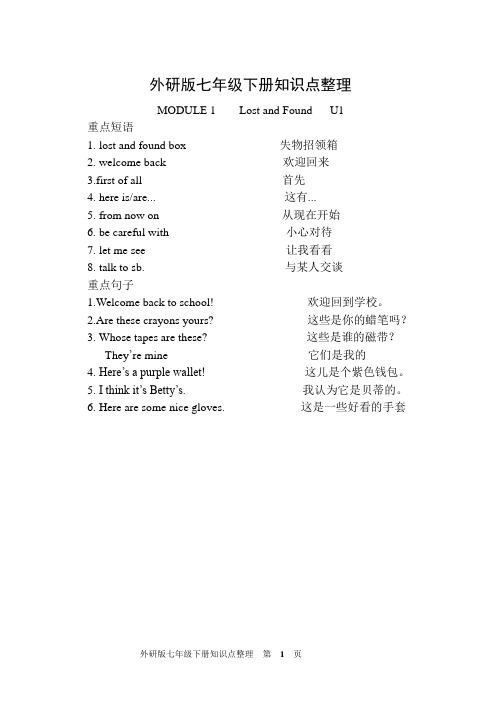
外研版七年级下册知识点整理MODULE 1 Lost and Found U1重点短语1. lost and found box 失物招领箱2. welcome back 欢迎回来3.first of all 首先4. here is/are... 这有...5. from now on 从现在开始6. be careful with 小心对待7. let me see 让我看看8. talk to sb. 与某人交谈重点句子1.Welcome back to school! 欢迎回到学校。
2.Are these crayons yours? 这些是你的蜡笔吗?3. Whose tapes are these? 这些是谁的磁带?They’re mine 它们是我的4. Here’s a purple wallet!这儿是个紫色钱包。
5. I think it’s Betty’s.我认为它是贝蒂的。
6. Here are some nice gloves. 这是一些好看的手套MODULE 1 Lost and Found U2重点短语9. mobile phone 移动电话,手机10. get on the bus 上车11. two thousand 两千12. look for 寻找13. at the moment 现在14. in a hurry 匆忙地15.many other things 许多其他的东西16. hundreds of 数以百计的17. strange things 奇怪的东西18. fifteen kilos of sausages 15公斤的香肠19. such as 例如重点句子7. They leave things on planes, on trains, on buses and in taxis.8. That's why there are lots and found office is at airports and stations9. Hundreds of people come here every day.10.They are looking for their phones cameras, watches, computers and many other things11.There are about a hundred bikes and a large boat12. Are you looking for fifteen kilos of sausages?7.他们把东西落在飞机上,火车上,公交车上或者出租车上。
- 1、下载文档前请自行甄别文档内容的完整性,平台不提供额外的编辑、内容补充、找答案等附加服务。
- 2、"仅部分预览"的文档,不可在线预览部分如存在完整性等问题,可反馈申请退款(可完整预览的文档不适用该条件!)。
- 3、如文档侵犯您的权益,请联系客服反馈,我们会尽快为您处理(人工客服工作时间:9:00-18:30)。
2012外研新版英语七年级下册知识点总结Module 1 Lost and found1、lost and found 失物招领the lost and found box 失物招领箱2、(1) welcome back to 欢迎回到某地... Welcome back to school.(2) welcome to +地点的名词欢迎来某地Welcome to China.(3) Welcome 跟地点副词时不带to welcome home 欢迎回家Welcome here .(4) You are welcome. 不用谢。
(5) give sb. a warm welcome 热烈欢迎某人They gave a warm welcome to us.3、first of all 首先= at first / firstly (常位于句首作状语,强调首要的事情或动作)First of all, you should finish your homework.4、there be 句型中谓语动词采用就近原则There is some food in the fridge.5、a lot of =lots of 许多既可以修饰可数名词复数,也可以修饰不可数名词。
There is a lot of water in the glass. I have lots of books in my room.6、(1) look at 看(强调“看”的动作)Come and look at my new coat.(2) look (不及物动词,单独使用,用以引起对方的注意) Look! That’s an English car.(3) see 看见(及物动词,强调“看”的结果) Can you see the bird in the tree?(4) watch 观看,仔细地看(比赛、电视、戏等)They are watching TV now.(5) read 看(书、报纸、杂志等) My mother is reading a book /a magazine /a newspaper.7、everyone/everybody 做主语,谓语动词用单数形式。
Everyone is here now.8、(1) be careful with /of sth. 注意/小心Be careful with/of the wet paint. 小心,油漆未干。
(2) be careful (not) to do sth. 小心(不要)做某事Be careful not to lose your key.9、(1) from now on 从现在开始You should study hard from now on.(2) from then on 从那时开始He worked harder from then on.10、(1) talk to sb 和某人说话(侧重主动说)Please talk to him right now.talk with sb 和某人说话(侧重两人都说)He is talking with his friends.talk about sth 谈论某事They are talking about their homework.(2) say 说,强调说的内容Can you say it in English?(3) speak 说,后面可以直接接语言。
He can speak English and a little Chinese.speak to sb 和某人讲话、谈话。
Can I speak to Tony?(4) tell 告诉,讲述,指某人把一件事、一条信息传达给别人或讲述一件事。
tell sb. sth. = tell sth. to sb. 告诉某人某事Please tell him the good news.11、(1) look for 寻找(强调动作)I am looking for my bike.(2) find 找到(强调结果)I can’t find my bike.(3) find out 发现,查明,(经过调查)Please find out when the train leaves.(4) search 搜索,调查They search the woods for a lost child.(5) look over检查The doctor looked over the patient carefully.(6) look after =take care of 照顾look after …well = take good care of …好好照顾(7) look forward to (doing) sth. 期盼,期待(做)某事12、get on the bus 上公交车get off the bus 下公交车13、(1) in a hurry 匆忙地She dressed herself in a hurry. He was in a hurry to leave.(2) hurry up=come on 快点儿Hurry up. The bus is coming.(3) hurry to do sth 匆忙做某事He hurried to catch the train.(4) hurry to sp. 匆忙去某地= go to sp. in a hurry He hurried to his office.hurry +地点副词(不带to) He hurries home. = He goes home in a hurry.14、hundreds of 成百的(大约数加s,加of)The old man has hundreds of books.two hundred (具体数不加s,不加of)There are two hundred students in the school.同样用法还有thousand、million、billion15、(1) leave sth. + 表地点的介词短语, 把某物落在/忘在某地, 切记:不能用forget。
I often leave my homework at home.(2) leave v. 离开leave + 地点名词We leave school at 5:00 in the afternoon.(3) leave for + 地点名词动身去某地He will leave for London next week.(4) leave v. 使保持……状态Please leave the windows open.(5) leave v. 把……留在…Can I leave my bike here? 我可以把自行车放在这儿吗?(6) leave n. 假期,休假I want to ask for two days’ leave. 我想请两天假。
15、every day 每天(副词,放句首或句末) He goes for a walk after supper every day.everyday 每天的,日常的(形容词,后面接名词) everyday life / English16、at the moment = at this moment = now 此时此刻,现在at that moment= then 在那时He is not at home at the moment.17、such as 例如,后面不加逗号(跟名词或动名词)He likes sports, such as basketball and football.for example 例如,后面加逗号(跟句子)He is a kind boy, for example, he is always ready to help others.18、(1) help sb. (to) do sth = help sb. with sth. 帮助某人做某事They often help me study my English. = They often help me with my English.(2) help n. 帮助(不可数名词)Thank you for your help.with the help of sb.= with one’s help 在某人的帮助下(3) help oneself to sth. 随便吃某物Please help yourself to some fruit.(4) can’t help doing sth. 情不自禁做某事She couldn’t help crying when she heard the news. 她情不自禁哭了起来19、(1) choose from 从……中挑选You can choose from the menu.(2) choose sb. sth. = choose sth. for sb. 为某人选某物He chose me a nice present. = He chose a nice present for me.(3) choose to do sth. 选择/决定/宁愿做某事He chooses to go to the park with us. 20、whose 代词,谁的whose +名词is this?= Whose is this +名词?这是谁的...?Whose book is this? = Whose is this book? 这是谁的书?21、名词性物主代词= 形容词性物主代词+ 名词His bike is new. But mine is old.of +名词性物主代词属双重所有格的一种形式。
a friend of mine, a pen of hers Module 2 What can you do?1、play后接乐器时, 乐器名词前要加the。
play the piano / violin/drum/guitar接球类、棋类名词时, 不加the。
play table tennis / football / basketball / chess2、ride a bike to sp. = go to sp. by bike骑自行车去某地I ride a bike to school.= I go to school by bike.3、the new clubs for this term 这学期的新俱乐部4、(1) --- Would you like to do sth? 你愿意做某事吗?--- Yes, I’d like / love to. (肯定回答) / Sorry, I’d like/love to, but I….(否定回答)(2)Would you like …? (请求或征询建议), 其答语用:Yes, please. /No, thanks.--Would you like a cup of tea?--Yes, please. / No, thanks.(3) would like to be = want to be 想要成为…I would like to be a doctor. = I want to be a doctor.(4) would you like to do sth? = Do you want to do sth.? 你想要做某事吗?Would you like to play games with us? = Do you want to play games with us?5、join加入(团体、组织),并成为其中一员He joined a tennis club.join in = take part in 参加活动I joined in the game.= I took part in the game.take an active part in 积极参加We should take an active part in school activities.attend 出席会议,到场,上课等attend a meeting 开会attend school 上学6、what about you?=how about you?= and you?你呢?what about doing sth.?= How about doing sth.?做某事怎么样?7、because所以so不能同时出现在一个句子中I didn’t go to school because I was ill. = I was ill so I didn’t go to school.8、that’s all 仅此而已,就这么多I can cook eggs, but that’s all.9、worry about = be worried about 担心...don’t worry 不用担心10、teach sth. 教…I teach English at this school.teach sb sth =teach sth to sb 教某人某事I teach him English.= I teach English to him.11、favourite = like...best 最喜欢English is my favourite lesson. = I like English best.12、really 确实(副词),修饰形容词或动词He runs really fast. Today is really hot.13、real 真实的(形容词),修饰名词This is a real story14、the start of = the beginning of ...的开始at the start of = at the beginning of15、what do/does sb. do? What be sb. ? 某人做什么工作?(提问职业)What does your father do? = What is your father?16、get on /along well with sb. 与某人相处融洽He gets on well with his classmates.get on /along well with sth. 某事进展顺利I get on well with my work.How do you get on with your friend? 你与你的朋友相处得怎样?17、work hard 努力工作,努力学习18、be/get ready to do sth. 乐于做某事,准备好做某事My good friend is always ready to help me with my English.We are / get ready to have a birthday party for her.19、choose ...as选择...作为Please choose me as your class monitor.20、promise to do sth 许诺做某事,保证做某事He promised to cook nice supper for us.21、enjoy喜欢,享受enjoy sth. enjoydoing sth. = like doing sth.Enjoy oneself = have a good time = have fun 玩得开心22、between 在两者之间between A and B 在A和B之间23、be good at =do well in 擅长24、get the best score 得到最好的分数25、do cleaning 打扫卫生do cooking 做饭do reading 看书do washing 洗衣服do some shopping = go shopping买东西26、tidy 整洁的--(反)untidy tidy (it)up 整理,收拾Tidy up the room now.27、be sure 确信I’m sure that he will get the first prize. 我确信他会获得一等奖。
